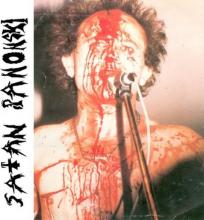Either way, a weirdo named Satan Panonski, who was apart of what counted as the Yugoslavian punk scene before the war and Croatia afterwards (feel free to call me out on the at one), was one of a scant few persistent with a constant vision of what music should sound like. Granted, he named himself Satan, so there was a screw loose somewhere. But in each of his myriad minute and forty second songs a wealth of entertainment lays.
With the disintegration of stability in the region folks who were at one point sympathetic with the assumed goals punk espoused turned to a strict nationalism as living conditions basically became untenable. It’d be difficult to figure the region mirrored what occurs in the Middle East, but there was no doubt some racial and ethnic issues at work.
And after doing a stint in the military Panonski resumed recording music. Since the works are in such scant supply, it’d be difficult to figure that after seeing war atrocities his music changed. But there’s a pretty blatant G.G. Allin thing at work here. And it’s not the early pop stuff.
The guitar sounds all over Nuklearne Olimpijske Igre arrive just this side of metal while retaining punk’s simplicity. Lord knows what Panonski’s singing about, but be assured it would startle your grandmother.
There are, however, a few brief musical reprieves. “Djeèakova Pjesma” doesn’t get past a really plain two note vamp – no there aren’t chords, just two notes played rhythmically – while Panonski yelps and howls as sedate as possible for the setting.
Given the time and place that this was recorded (early nineties, give or take), it’s remarkable that Nuklearne Olimpijske Igre exists at all. But to a certain extent that’s why punk’s been able to persevere for so long. Of course, it’s all turning into a musical museum and Panonski doesn’t do too much in the way of innovation. It’s just good, dumb (sounding), atonal punk stuffs.
